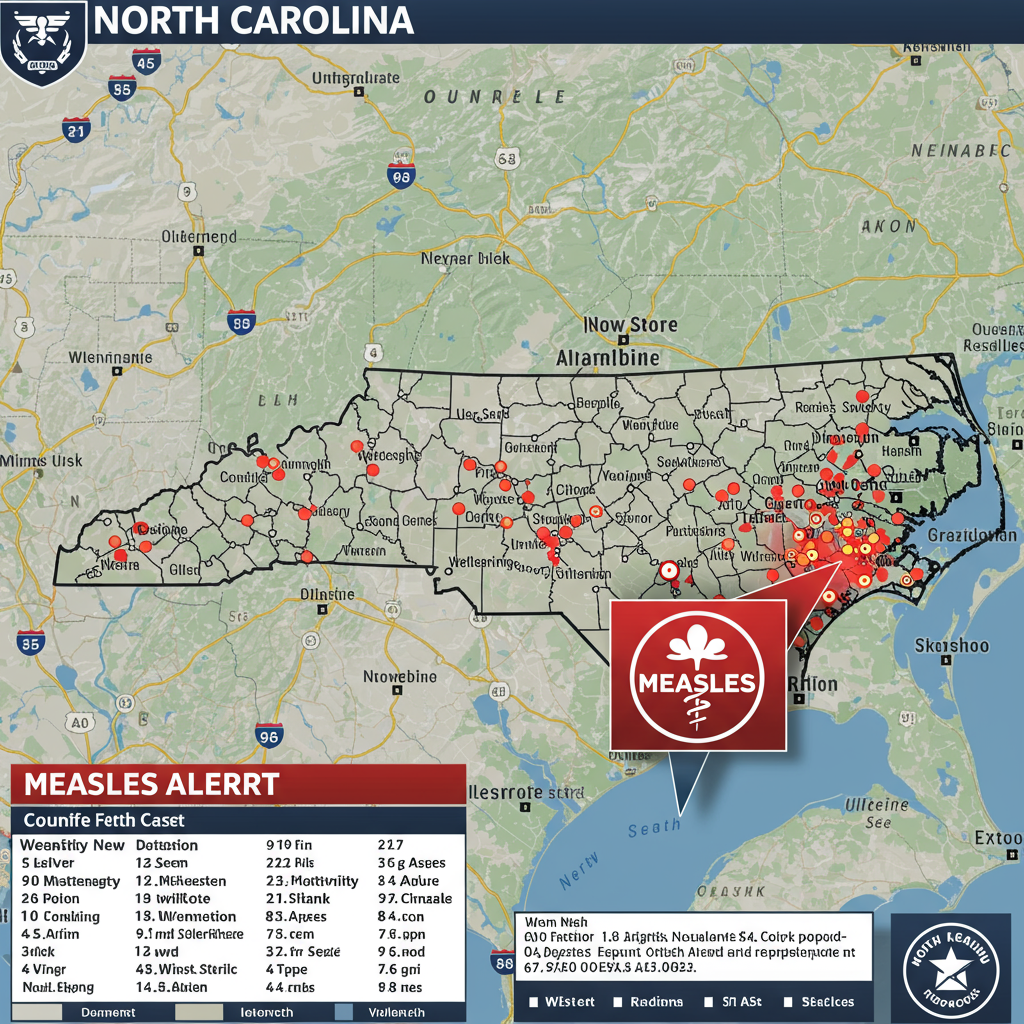North Carolina Issues Measles Alert Following First Case of 2025
RALEIGH, N.C. – Public health officials in North Carolina are alerting residents after confirming the state’s first case of measles for 2025. The North Carolina Department of Health and Human Services (NCDHHS) announced the case involves a child who was visiting the state from a country currently experiencing significant measles outbreaks.
The child visited areas within Forsyth and Guilford counties while potentially contagious. Due to privacy considerations, specific details about the individual and their family will not be released. However, state and local health departments are working collaboratively to identify potential exposure sites and times to inform the public.
Potential Exposure Locations and Times Identified
Health officials have identified several locations in Forsyth and Guilford counties where potential exposure to measles may have occurred. Individuals who visited these specific places during the listed times should be vigilant and monitor for symptoms:
Piedmont Triad International Airport: Thursday (date not specified) from 11:30 p.m. to 1:30 a.m. Friday
Sleep Inn (1406 Heartland Drive, Kernersville): Thursday 11:30 p.m. to Friday 2:50 p.m.; Friday 5:15 p.m. to Saturday 11:35 a.m.; Saturday 5:30 p.m. to Sunday 12:20 p.m.
McDonald’s (14000 Heartland Drive, Kernersville): Morning of Friday, June 20
Greensboro Science Center (4301 Lawndale Drive, Greensboro): Friday 1:30 p.m. to 6:15 p.m.
Ice cream shop at the Piedmont Triad Farmers Market (Greensboro): Friday 4:40 p.m. to 5 p.m.
Greensboro Aquatic Center foyer (1921 West Gate City Blvd., Greensboro): Saturday 10 a.m. to 12:05 p.m.
Greensboro Partee Shack (3712 South Holden Road, Greensboro): Saturday 10:15 a.m. to 1:20 p.m.
Lowes Foods (240 Market View Drive, Kernersville): Saturday 4:50 p.m. to 7:10 p.m.
This list is intended to alert those who may have been present to watch for signs of illness.
Understanding Measles: Symptoms and Transmission
Measles is a highly contagious viral illness that can lead to serious health complications, especially in young children and immunocompromised individuals. It spreads easily through the air when an infected person talks, coughs, or sneezes. The virus can remain airborne or on surfaces for up to two hours after the infected person has left an area, making public spaces potential transmission sites.
Initial symptoms typically appear 7 to 14 days after exposure, though they can take up to 21 days to develop. These often include:
High fever (potentially spiking above 104°F)
Cough
Runny nose
Red, watery eyes
- Tiny white spots inside the mouth (Koplik spots), which may appear two to three days after initial symptoms.
- www.citizen-times.com
- www.wral.com
- www.witn.com
- abc11.com
- whky.com
A characteristic red, raised, and blotchy rash usually begins on the face three to five days after symptom onset and then spreads downwards to the rest of the body.
If You Think You’ve Been Exposed or Develop Symptoms
If you were potentially exposed at one of the listed locations or believe you may have been in contact with the virus, check your vaccination status.
Individuals who develop symptoms consistent with measles (fever and rash) should contact their healthcare provider or the nearest emergency room in advance before arriving. This allows staff to take precautions to prevent the spread of the virus to others. Laboratory testing for measles is generally recommended only after symptoms appear.
For individuals at higher risk of severe illness, such as infants too young to be vaccinated, immunocompromised persons, or pregnant women, contacting a doctor immediately following a potential exposure is crucial. While the timeframe for receiving post-exposure prophylaxis (PEP) to potentially prevent illness may have passed for many individuals exposed in this specific case, high-risk groups should still consult their doctor about available options.
Vaccination: Your Best Protection Against Measles
Public health officials emphasize that getting vaccinated is the most effective way to protect yourself and your loved ones from measles. The measles-mumps-rubella (MMR) vaccine is highly effective; two doses are approximately 97% effective at preventing measles.
The Centers for Disease Control and Prevention (CDC) recommends children receive their first MMR dose between 12 and 15 months of age and the second dose between ages 4 and 6 years. However, NCDHHS strongly recommends that all unvaccinated individuals aged one year and older receive the measles vaccination.
“Getting vaccinated against measles continues to be the most important step we can take to protect ourselves and our loved ones,” said NC Health and Human Services Secretary Dev Sangvai. “It is important to check with your health care provider to ensure you are current with all your vaccines.”
Parents are especially encouraged to ensure their children are up-to-date on the MMR vaccine. Unvaccinated adults should also consider getting vaccinated.
This confirmed case comes as the United States has seen an increase in measles cases, reporting the highest number since 2019, with 2025 projected by some reports to be the worst year since the disease was declared eliminated decades ago. The highly contagious nature of measles, combined with potential declines in vaccination rates, raises concerns among health professionals about the possibility of further spread, sometimes referred to as a “perfect storm” scenario. The peak of summer travel season also increases the potential for rapid transmission.
North Carolinians can contact their healthcare provider or local health department to check their vaccination status and schedule an MMR vaccine appointment if needed. Stay informed and take proactive steps to protect yourself and your community.




